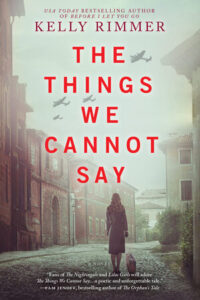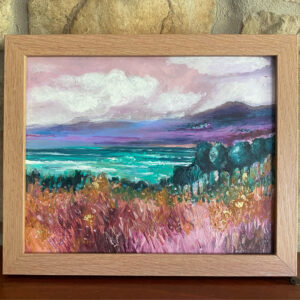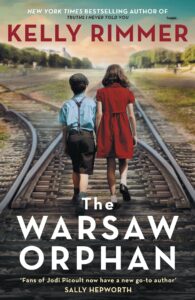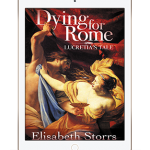 My guest this month is Kelly Rimmer, the New York Times, Wall Street Journal, USA Today and worldwide bestselling author of contemporary and historical fiction, including The Secret Daughter and The Things We Cannot Say. Kelly lives in rural Australia with her family and a whole menagerie of badly behaved animals. Her novels have been translated into more than two dozen languages. Her latest release is The Warsaw Orphan.
My guest this month is Kelly Rimmer, the New York Times, Wall Street Journal, USA Today and worldwide bestselling author of contemporary and historical fiction, including The Secret Daughter and The Things We Cannot Say. Kelly lives in rural Australia with her family and a whole menagerie of badly behaved animals. Her novels have been translated into more than two dozen languages. Her latest release is The Warsaw Orphan.
You can connect with Kelly via her website, Facebook, Twitter and Instagram.
You can find Kelly’s extensive list of books at her Amazon author page.
What or who inspired you to first write? Which authors have influenced you?
I decided I was going to become an author the first time I read Heidi, by Johanna Spyri. I was probably 8 or 9 and I just fell in love with the way that story transported me.
I try to learn from every book I read, so over the years, hundreds or maybe even thousands of authors have had something to teach me.
What is the inspiration for your current book? Is there a particular theme you wished to explore?
I was in Poland researching for another novel in 2017 when I first encountered real-life Polish nurse and social worker Irena Sendler. She spearheaded an effort to rescue Jewish children from within the Warsaw Ghetto, ultimately saving the lives of over 2,500 children. I could not stop thinking about Irena, and I also became quite fixated on the team who worked with her in this rescue effort. How were these women? What drove them to risk their lives day in and day out for the sake of children and families they’d never met? I wanted to explore the answers to these questions in The Warsaw Orphan, and also to reflect on the tumultuous years in Warsaw from 1942.
What period of history particularly inspires or interests you? Why?
 I’ve written two books now set in Poland during WW2. My fascination with the era stems from my maternal grandparents, who lived in rural Poland until they were displaced by the war. Although I was lucky enough to have a close relationship with them before their deaths, they effectively started a new life once they arrived here in Australia, and to this day there’s much my family does not know about their lives before and during the war.
I’ve written two books now set in Poland during WW2. My fascination with the era stems from my maternal grandparents, who lived in rural Poland until they were displaced by the war. Although I was lucky enough to have a close relationship with them before their deaths, they effectively started a new life once they arrived here in Australia, and to this day there’s much my family does not know about their lives before and during the war.
What resources do you use to research your book? How long did it take to finish the novel?
This book took about 18 months. I had planned to travel to Poland to research it but the pandemic got in the way of that so I completed my research from home. We are so fortunate to live in these days when information is relatively easy to access. Between my notes from a previous research trip, reference books, and some amazing online libraries and repositories, I was still able to complete my research. My absolute favourite research resources are photographs and oral histories.
What do you do if stuck for a word or a phrase?
Feeling stuck is usually a sign that I need to either skip a sentence or paragraph (or even a scene) and come back to it later. Sometimes that means taking a break from my work altogether, other times I will just leave a gap in my manuscript and keep going.
Is there a particular photo or piece of art that strikes a chord with you? Why?
 I purchased a piece by Cassandra Bland earlier this year. It’s just a small painting of the South Coast of NSW, however it reminds me of a particular spot near my aunt’s house. That spot has been a special ‘thinking spot’ for me for a long time. The painting is a special reminder of some life-changing decisions I’ve made over the years.
I purchased a piece by Cassandra Bland earlier this year. It’s just a small painting of the South Coast of NSW, however it reminds me of a particular spot near my aunt’s house. That spot has been a special ‘thinking spot’ for me for a long time. The painting is a special reminder of some life-changing decisions I’ve made over the years.
Is there anything unusual or even quirky that you would like to share about your writing?
My office is a tiny home, situated in some bushland near my house. I’m currently renovating it – it’s taking forever!
Do you use a program like Scrivener to create your novel? Do you ever write in long hand?
My handwriting is so poor that even I can’t read it sometimes, so I try to avoid long hand. I do use Scrivener, but I also dictate around 80% of my first drafts, and for that I use Dragon Dictate. Once a rough draft is finished, I move it into Word and move through many drafts polishing there.
What advice would you give an aspiring author?
I suggest aspiring writers ignore writing advice unless it strongly resonates for them. There’s so much advice around, some of it brilliant, some of it awful – and what’s awful advice to me might be brilliant advice to you!
Tell us about your next book.
My next book is probably my most ambitious project yet – the working title is The German Wife. It’s a story which spans two decades in the lives of two women as they navigate the build up to WW2…and the aftermath.

Inspired by the real-life heroine who smuggled thousands of Jewish children to safety during WWII, the powerful new novel by the New York Times bestselling author
In the spring of 1942, young Elzbieta Rabinek is aware of the swiftly growing discord just beyond the courtyard of her comfortable Warsaw home. But she has no idea what goes on behind the walls of the Jewish Ghetto nearby until she makes a discovery that propels her into a dangerous world of deception and heroism.
Elzbieta comes face to face with the plight of the Gorka family who must give up their newborn daughter – or watch her starve. For Roman Gorka, this final injustice stirs in him a rebellion not even his newfound love for Elzbieta can suppress. His recklessness puts their families in harm’s way until one violent act threatens to destroy their chance at freedom forever.
Kelly Rimmer, bestselling Australian author of Truths I Never Told You and The Things We Cannot Say, has penned her most meticulously researched and emotionally compelling novel to date.
Thanks for joining me, Kelly. I’m sure readers will enjoy learning more about the war through the eyes of Polish characters.
 Haven’t subscribed yet to enter into giveaways from my guests? You’re not too late for the chance to win this month’s book if you subscribe to my Inspiration newsletter for giveaways and insights into history – both trivia and the serious stuff! In appreciation for subscribing, I’m offering an 80 page free short story Dying for Rome -Lucretia’s Tale.
Haven’t subscribed yet to enter into giveaways from my guests? You’re not too late for the chance to win this month’s book if you subscribe to my Inspiration newsletter for giveaways and insights into history – both trivia and the serious stuff! In appreciation for subscribing, I’m offering an 80 page free short story Dying for Rome -Lucretia’s Tale.



I’m always amazed – and awed! – by the bravery of people like Elzbieta Rabinek, and can’t help wonder how I would act in such a situation. I’d like to think I’d do good, but would I really have such courage…?
Such a terrible time in which to live. The survival stories are heartwarming but gut-wrenching at the same time.
Sounds like a good read.
Sounds good.
I am looking forward to reading this new novel about the courageous Irena Sendler!
The first WWII book I read as a young girl took place in at the Warsaw Ghetto in Poland. It was shocking to me and I am drawn to WWII novels. I was a child at this time and wrote to my uncle who was serving in the army in Germany. I remember rationing. Thank you for this chance to read this book.
Hello, I just want to thank you for writing. After all where would we be without authors it helps us escape from problems or a mundane yet busy life. Authors really are the best thing since sliced bread, it’s not a easy job to do so I give you a round of applause 👏 thank you keep up the good work.
Thank you for writing, ” The Warsaw Orphan”. I love reading stories of the unsung heroes and heroines of WWII and especially how they thwart the efforts of the Third Reich machine. I also adore the pictorial manifestation of your “thinking spot”. What a perfect pondering post.
I took a class about Hitler and the Nazi Regime in college and it was so fascinating. Since then, I have continued to read about that sad time in the history of our world.
Would enjoy reading your book. I always like stories with a bit of History in them.
This is one book that I have put at the top of my “must-read” list. It is so very moving in that it shows that, indeed, even one person can accomplish so much when they put their mind to it and have a true conviction for what they are attempting. Kudos for writing such a heartfelt story about this woman’s bravery and ‘sense of right and wrong.’ Everyone should share in this brilliantly told story.
Thank you Kelly and El imagery for the lovely and informative interview. This book is one I must read this summer. The interview has “talked” to me telling me it is a must read. Ever since I read Diary of a Young Girl by Anne Frank and Mila 18 by Leon Iris this period and especially the Warsaw Ghetto have interested me. As first of the Baby Boomers, i have wanted to learn what my parents age bedroom experienced as young adults. I love your painting of your special thinking spot Kelly and your thoughts on writing. FYI, y husband is of Polish descent and our last name of Cruze was changed by his grandfather from Chruszcz.
I have been immersed reading about WWII! I recently watched 2 movies, “Schnidler’s List” and “The Pianist”. After 20 or so years, I watched both these movies with our son and see it from a different perspective. I love reading about WWII and learning history through historical fiction novels. I am looking forward to reading “The Warsaw Orphan”. I recently finished reading “The Nature of Fragile Things” as well as “As Bright as Heaven”, both by Susan Meissner.
I have long been interested in diaries and stories of the brave and righteous folks who sheltered Jews in WWII and who helped them escape/survive the horrors. Last summer I read a couple of diaries that were found buried or hidden in the ruins of the ghettos. I’m interested in reading ‘The Warsaw Orphan’ and seeing the results of the war through another pair of eyes!